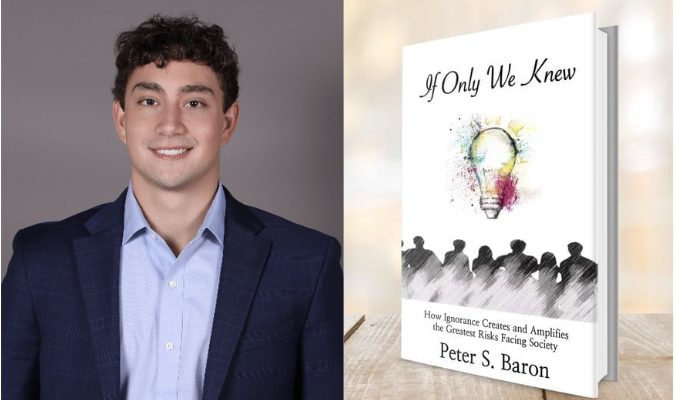Junior Peter Baron, author of “If Only We Knew” published his book on Nov. 21, 2021. Since then, he has been able to sell copies, speak on behalf of the book and participate in a Q&A session sponsored by the Dimenna-Nyselius Library on March 28.
Baron describes his work as “cultural criticism.” His main argument cites and responds to a culture in the United States, which “promotes individualism and selfishness” perpetuated in part by “the ultra-wealthy elite class.”
Baron expands that this elite class has “gained unprecedented control over the media and political spheres, especially in the last 40 years.”
“Through this control,” Baron continues, they “spread misinformation, which creates a public ignorance where people either don’t know about important things [or] social issues, or they […] accept falsehoods to be true.”
Thus, Baron discusses the risks of social problems where “the elite profit and empower themselves based on the existence and amplification of those risks who have an interest in maintaining any social problems.”
However, Baron proposes a solution through a “cultural revolution.” Through this revolution “we start prioritizing the values of compassion, selflessness and forgiveness, instead of the current culture we have.”
Baron has an individually designed interdisciplinary major titled “socioeconomic inequalities: inevitable or avoidable.” This has transcended into his book through topics included such as psychology, sociology, politics and history. Baron describes his interdisciplinary approach to play “a huge part of how [he] wrote the book and how [he] think[s] of social problems.”
He is also involved on campus as the founder and leader of the Social Justice Book Club. Additionally, Baron mentions he has hosted several Quick Center events recently.
Baron reflects upon a specific event titled, “Are the racist ideas of today the same as the racist ideas of the past?,” where there were professors serving on the panel from different academic disciplines. Through modeling conversation they “showed [him] how interdisciplinary scholarship is probably the most useful in understanding social problems.”
Baron didn’t always know he was going to write a book. His interest, however, was sparked in his Introduction to Rhetoric class with Assistant Professor of English Writing Tiffany Wilgar, Ph.D.
Upon learning about course material relevant to what would become of his book, Baron developed a thesis for Wilgar’s review.
Having received feedback and support from Wilgar, he then began the writing process.
“I just kind of jumped into it and started writing,” Baron says.
Being “right out of high school” as he began the drafting process, Baron relied on what he was familiar with in his writing strategy. Well-versed in writing lengthy term papers, Baron split up the book into sections he likens to the papers he wrote in high school.
“I tried to split up my book into chapters about different things, and just write each chapter as a separate term paper, all with the same thesis underlying them,” Baron relays.
“I blocked out an hour that I could just write and not do anything else,” he says, “I just told myself, ‘if I consistently try to write for an hour at least three times a week I’ll eventually be able to get there,’ and that’s basically what happened.”
As an undergraduate student, Baron relates his book to other students and discusses its relevance to young adults.
“The book applies really directly to college students. One of the reasons I wrote the book was because I want our generation to have a voice in these issues,” Baron adds.
Baron intends to remind younger generations that hope is not lost and rather that “there are solutions out there.” He states that solutions can be found in his book and “evidence based on local levels that need to be scaled nationally.”
“With social media and the news today…it seems that everything is getting a lot worse. And to an extent it is getting worse, but [that] doesn’t mean there’s no hope out there,” Baron states.
When prompted about his book’s relationship with recent events on campus surrounding the removal of a Black Lives Matter flag, Baron claims “there is a connection…a little looser.”
He continues, “we tend to think that if Black people are given more rights or even if we put up a Black Lives Matter flag that inherently takes away from the rights of white people.”
He states his book argues that this is not the case, instead “it is actually helping the Black community [and] we’re helping the white community too. It’s an idea called a ‘curb cut’ in my book.”
“Every time in history we’ve done things to uplift the Black community it’s uplifted the entire community,” he adds.
Baron continues that “one thing I would say regarding the Black Lives Matter flag is that anti-racist initiatives on campus won’t just help the Black community, but it will help the entire campus and just make us a better Fairfield.”
Baron expresses key points he wants readers to take away from his book.
One is “just becoming more aware of these issues and why they exist in the first place, and why it’s been so hard to solve them.” He adds that he wants people to have “a better grasp on the current social political climate.”
Secondly, Baron alludes to a repeated theme of culture in the book. Specifically, in the last chapter he touches on “the benefit of being a giver, [and] being someone who thinks differently is really a person for others.”
Baron compares this to our culture which he claims “tends to make us into people that think that we have to work for ourselves. And the most important thing is money.” However, he explains that in his book “ being a person for others is not just a way to be more fulfilled, but it’s also a way to be more successful.”
Through the evidence given in the book Baron hopes “that people will leave the book being a more compassionate, selfless and forgiving person.”


Leave a Reply